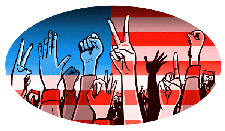Fall/Winter,
2003-2004
Injustice and dissent have been defining features of America since its founding. That is the legacy of the framersí decision to omit equality as constitutional word or principle and, instead, to build the "blessings of liberty" on the antithetical foundation of explicit inequality. Even the Fourteenth Amendmentís guarantee of equal protection nearly a century later (1868) proved hollow as 86 more years elapsed before the Supreme Court retracted its racist rulings of Dred Scott and Plessy. With 2004 marking an additional half-century since Brown v. Board of Education (1954), exclusion, discrimination and oppression based on race, ethnicity, religion, gender, class, age, disability and sexual orientation continue to defy the promise of equality. Dissent is essential to correcting inequality and other injustices, yet protesters frequently have been excluded from the protections of the First Amendment. From the 18th Centuryís odious Sedition Act to the 21st Centuryís reactionary USA Patriot Act, Congress has criminalized political dissent. In this program, we will examine how injustice and dissent, along with the political and cultural struggles surrounding them, have contributed to the making of America. We will seek to understand how these have come to be such defining features of the American character, culture and experience. Credit awarded in: Ethnic studies, constitutional law, racism and the law, women's studies, LGBT studies, critical reasoning and writing, appellate advocacy Program will allow students to fulfill Evergreen expectations in the following categories: 1. Articulate and assume responsibility for your own work. 2. Participate collaboratively and responsibly in our diverse society. 3. Communicate creatively and effectively. 4. Demonstrating integrative, independent and critical thinking. 5. Apply qualitative and apply creative modes of inquiry appropriately to practical and theoretical problems across disciplines. 6. As a culmination of your education, demonstrate depth, breadth, and synthesis of learning and the ability to reflect on the personal and social significance of that learning. Total credits: 32 Program
is preparatory for careers and future studies in ethnic studies, political
science, public policy, law, social justice and advocacy and organizing,
teaching.
|
